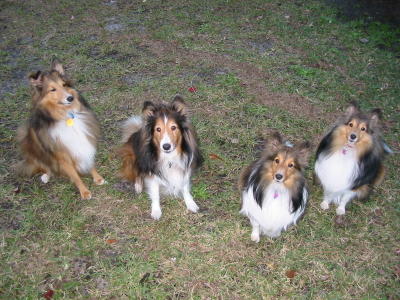good dogs and their gifts of love
My life has been blessed and graced by dogs since I was a small child. Although I knew the direct love of my mother and have known the direct love of God through other people since, my dogs were my companions, my best friends. I cried countless tears into their furry shoulders all through my life. Whenever something seemed overwhelming, terrible, miserable, I would pour all of that into my dogs, holding them close to me. And somehow they knew that I needed them, that I was desparately afraid or sad and needed them to be my friends.
My dogs defined my life, giving me friendship and love when I was too shy and too awkward to find it among my peers. They are part of me, of who I am in the world today.
There was Ginger, who was really my mother's dog (from whence does the food come? there lies my allegiance) but who was remarkably patient with my childhood antics. I'm pretty sure she didn't like it when I made scraps of cloth into "tail dresses and paw dresses." She was patient and tolerant beyond all reason. (1985-2000)
Brandy, the first dog who was mine, who rolled around with me in the backyard, and still adores me even though I can only go home to where she lives with my mother a few times each year. She's the big barker of the family, defending us from every school bus, every leaf, every perceived attack on the house.
There was Sarge, who was the most wonderful dog. Fiercely independent, he would try to bark the thunder boomers away, getting thoroughly wet in the process. He would run along the outside fence, barking madly at the thunder, telling it not to come near *his* house. He was so intent on getting his toys that he would race after any ball thrown and go so fast that he would roll over in his attempts to catch it. He liked to carry around his kitty all the time. And if Oliver had a toy and Sarge happened to want it.. well, Sarge would very quietly take it from Oliver, his best friend, and the wimpiest dog known to man. (1996-2002)
Oliver, Sarge's best friend. Now the reluctant leader of our Shelties, it is Oliver who leads the charge against encroaching squirrels. Also known a seal dog, because of how his face looks in certain angles, Oliver adores my mom. He's also terrified of being lifted off the ground and turns as wooden as a board while still struggling, if you can imagine it, thereby increasing the likelihood of being dropped, the silly boy.
Rocky, my mom's rehabilitation project. Abandoned and found wandering the backroads of Iowa, he was passed on to a rescue group in Wisconsin, who brought him 1200 miles south to us. He would only sleep in a little tiny bathroom for weeks when he first came. He's only just beginning to figure out, at the ripe old age of 14, how great being a dog can be when you have someone who loves you and cares for you.
Emma & Fiona: the (well, our) Dixie Chicks. 30 combined pounds of happy, loving, gleeful girls. They're sisters, and Fiona always gets to retrieve the ball (we keep an extra to throw for Emma when Fiona is occupied). They're great friends and part of Team Anti-Squirrel led by Captain Oliver.
This is my tribute to them, to the love they give simply because they exist, to the people who brought all of these dogs into our family's life. They have given the most amazing and continuous gifts of friendship and love to me. Sarge, Oliver, Rocky, Emma, and Fiona all came to us through rescue groups, so my thanks go out to those who, for the love of dogs, welcome in the abandoned, the homeless, the left behind; find them homes; and bring the gifts of love into other families. Their work is never ending, and their sacrifices often go unnoticed, unremarked, and unheralded. But I thank them for the work they do, and the dogs that I have known through their efforts.
The opening quote is from Plan B: Further Thoughts on Faith by Annie Lamott (2005).

From left to right: Oliver, Brandy, Emma, and Fiona.
(Rocky not pictured.)
 Sarge.
Sarge.

